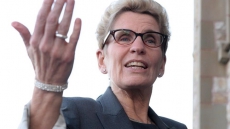IQALUIT, Nunavut — Nunavut's minister of health and justice has quit cabinet over the territory's contentious plan to open a liquor story in Iqaluit.
Paul Okalik, who is also a former premier, told the legislature that as a recovered alcoholic, he cannot support opening a liquor store without a proper way to treat addictions.
In an interview with CBC North, Okalik said he's not against a liquor store, but he wants to see an addictions treatment facility open first.
He told CBC he struggled with his decision for a long time.
In the end, he said, he had to follow his heart.
Premier Peter Taptuna accepted Okalik's resignation in a statement and said the portfolios will be reassigned next week.
"I want to thank Mr. Okalik for his dedicated service to cabinet on behalf of Nunavummiut and as a member of the executive council," Taptuna said.
Iqaluit's last liquor store closed in the 1970s and opening a new one has been an emotional issue. Some argue Iqaluit is growing and deserves the convenience of a liquor store. But others fears greater access to booze would cause further social problems in a community that already has plenty of them.
Last year, Iqaluit residents voted strongly in favour of opening a retail store for beer and wine. More than three-quarters of the voters approved the motion in a plebiscite.
Access to liquor is tightly controlled in the territory, but bootlegging is a problem.
People can have alcohol shipped to a heavily secured government warehouse in Iqaluit, which takes three or four days and costs about $60 for a case of 24 beer. Or they can apply for a liquor import permit and order it directly, which takes about the same time but costs less.
Some communities have committees that regulate who can buy liquor, how much and how often. Some communities, in theory, are dry.
Nunavut has a consensus government. There are no political parties. The premier and cabinet are picked from the elected members of the legislature and the rest of the members serve as opposition.




